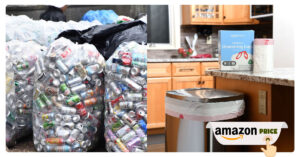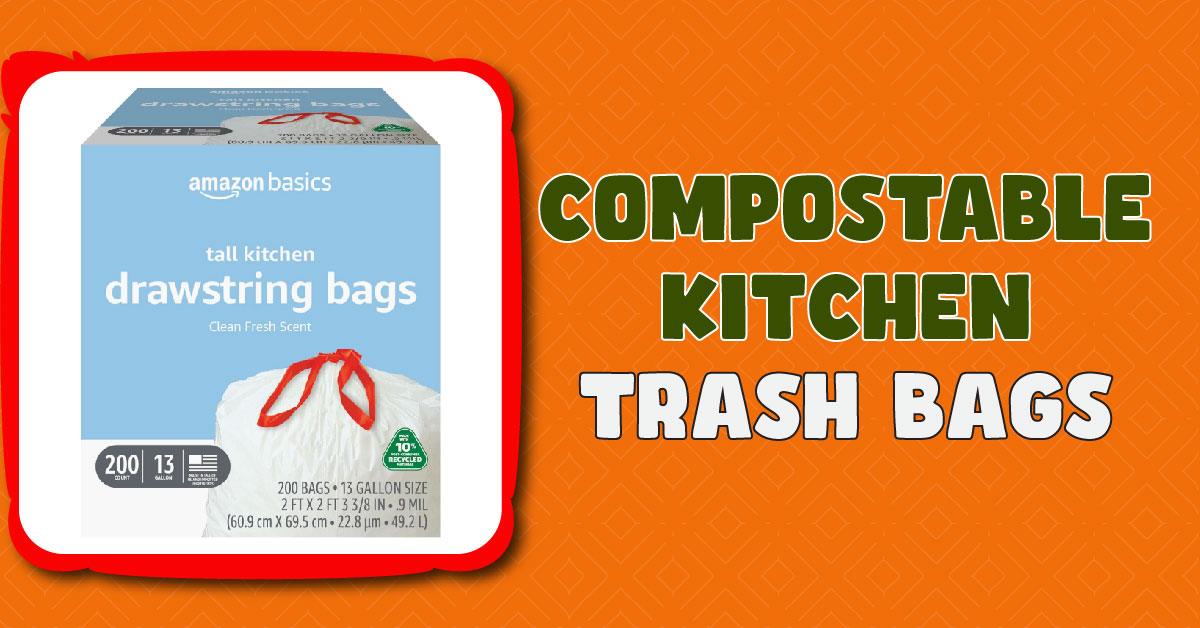Switching to compostable kitchen trash bags felt like a small change—until I saw how much plastic I was throwing away. Those plastic liners? They sit in landfills for decades. They barely break down. So, I made the switch. And honestly? It was easier than I thought.
If you want a greener way to handle kitchen waste, compostable bags are a great choice. They break down fast, cut plastic waste, and hold up just as well as regular trash bags—if you pick the right ones. In this guide, I’ll cover the best compostable kitchen trash bags, how to choose the right size, and how to compost them the right way.
What Are Compostable Kitchen Trash Bags?
At first glance, compostable kitchen trash bags look like regular plastic ones. But they’re different. They’re made from plant-based materials like cornstarch, not petroleum. This means they break down naturally, leaving no harmful plastic behind.
Many people confuse compostable and biodegradable bags. But here’s the truth: biodegradable bags can still have plastic and take years to break down. Compostable bags, on the other hand, fully decompose into organic matter, just like food scraps.
Not all compostable bags work the same way. The best ones have certifications like BPI (Biodegradable Products Institute) or ASTM D6400. These labels prove the bag will break down in composting conditions. Without them, you might just be buying another plastic bag with a “green” label.
Switching to compostable bags isn’t just about feeling good—it makes a real difference. Less plastic in landfills. Fewer microplastics in the ocean. A cleaner planet for future generations. Why not make the switch today?
Benefits of Using Compostable Trash Bags
Switching to compostable kitchen trash bags is an easy way to cut plastic waste. They help the planet without changing your routine. But are they strong enough? Do they break down? Let’s go over the facts.
Eco-Friendly & Sustainable
Plastic trash bags can last hundreds of years. Compostable ones break down much faster, leaving no harmful waste. If you want to reduce your carbon footprint, this is a simple step.
🚫 Odor Control & Leak Resistance
No one likes a stinky trash can. The good news? Many compostable bags control odors better than plastic. They let air flow, which helps stop bad smells. Plus, they’re designed to hold leaks, so your trash stays clean.
Great for Composting
If you compost at home, these bags make it easier. Just toss them in with your food scraps—no need to remove the liner. Many cities also accept compostable bags in organic waste programs. This makes waste disposal greener and simpler.
Strong & Durable
Worried about rips? New compostable bags are tough. Many brands make them tear-resistant and stretchable, just like plastic. They hold up to daily use, so you don’t have to worry about spills.
Making the switch is good for your home and the environment. Less plastic. Less waste. And just as strong as the bags you already use.
Choosing the Best Compostable Kitchen Trash Bags
Picking the right compostable trash bag isn’t hard, but it does matter. You want a bag that fits your kitchen. The right bag makes a difference. Let’s talk about how to pick it.

Best offer at amazon
Consider the Right Size
Not every kitchen needs the same size trash bag. Most people use 13-gallon tall kitchen bags. But if your kitchen fills up quickly, you may need a bigger one. Measure your trash can to find the right fit.
The best compostable bags should stretch to fit your can. But not so tight that they rip. A bag that’s too small will pop when you tie it. That’s just annoying.
Look for Certifications
You might ask, “How do I know these bags are compostable?” It’s a smart question. Look for certifications like BPI or ASTM D6400. These labels say the bag will break down in compost. That’s key.
Some bags also have the TÜV Austria Home Compostable label. These are made to break down in backyard compost bins. That’s great if you compost at home.
Material Matters
Compostable bags come from plant-based materials like cornstarch or PLA (polylactic acid). These are not plastic. They break down quickly. But some materials are stronger than others.
PLA bags are rigid and sturdy. Cornstarch bags are flexible but just as strong. Pick a bag that fits your needs. Some compostable bags are for yard waste. They may not work as well for food scraps.
Best Compostable Kitchen Trash Bags (Top Picks)
Not all compostable bags are the same. Some rip too easily. Others don’t break down fast enough. So, how do you pick the best one? I’ve tested and researched top-rated options. Here’s what I found.
1. Compostable Tall Kitchen Trash Bags
Size: 13-gallon
Certifications: BPI, ASTM D6400
👍 Pros:
✔️ Strong and tear-resistant
✔️ Leak-proof design
✔️ Fully compostable in municipal composting systems
👎 Cons:
❌ Costs more than plastic bags
❌ Not the best for backyard composting
These bags work well for everyday trash. They hold up, even with wet waste. If you need something durable, this is a solid pick.
2. 3-Gallon Compostable Bags
Size: 3-gallon (great for small bins)
Certifications: TÜV Austria Home Compostable
👍 Pros:
✔️ Breaks down in backyard compost
✔️ Fits small bins perfectly
✔️ No synthetic plastic
👎 Cons:
❌ Not as strong as bigger bags
❌ Can degrade faster in humid areas
If you compost at home, these bags are a great choice. They’re small but sturdy—perfect for food scraps.
3. Extra-Thick Compostable Bags
Size: 13-gallon
Certifications: BPI, ASTM D6400
👍 Pros:
✔️ Extra-thick for heavy waste
✔️ Great odor control
✔️ Stretches without tearing
👎 Cons:
❌ Takes longer to break down in backyard compost
❌ Slightly bulkier than thinner options
Need something strong? These bags handle big messes like a champ. They hold up to wet, heavy trash, making them great for busy kitchens.
How to Use and Dispose of Compostable Trash Bags Properly
So, you’ve got your compostable trash bags—great choice! But using them the right way matters. If you don’t store, fill, or dispose of them correctly, they might tear too soon or not break down as expected. Here’s what you need to know.
Store Them Right
Compostable bags aren’t like plastic ones. They’re sensitive to heat and moisture. Keep them in a cool, dry place, away from sunlight. If they sit in a hot, humid spot (like under the sink), they might start breaking down before you use them!
👉 Quick tip: Store extra rolls in an airtight container. It helps them last longer.
Don’t Overfill or Overload
These bags are strong but have limits. If you pack in too much weight, they might rip when you take them out. Fill them about three-quarters full for best results. If you toss in wet scraps like melon rinds, use two bags or add paper towels to absorb moisture.
👉 Pro tip: Line the bottom with newspaper. It helps prevent leaks.
Know Where to Compost
Not all compostable bags break down the same way. Some need industrial composting, while others work in home compost bins.
Municipal Composting: Many cities collect compostable waste. Check your local rules.
Home Composting: Look for TÜV Austria Home Compostable bags. They break down in backyard bins. Cut them into smaller pieces to speed up composting.
👉 Important: Compostable bags won’t break down in landfills. If you throw them in regular trash, they sit there like plastic.
How Long Do They Take to Decompose?
Compostable bags break down in three to six months in the right conditions. That’s much faster than plastic, which takes hundreds of years. Industrial composting speeds it up. In home compost bins, it may take longer, especially in cold weather.
👉 Fun fact: Worms love compostable bags! If you have a worm bin, chop the bag into small pieces. They’ll eat through it faster.
🚫 Mistakes to Avoid
❌ Throwing them in regular trash – They won’t break down in a landfill.
❌ Storing them in humid places – Moisture makes them weak before use.
❌ Using the wrong bags – Some “biodegradable” bags still have plastic.
Using compostable trash bags is a small change with a big impact. When used right, they help cut plastic waste and keep compost clean. Ready to toss your trash the eco-friendly way?
What I Like
Switching to compostable kitchen trash bags was a small change that made a big difference. Here’s what I love about them:
- Eco-Friendly & Guilt-Free – No more tossing plastic into landfills. These bags break down naturally, so I know I’m reducing waste.
- Strong & Reliable – I was worried they’d rip, but they hold up well—even with food scraps and coffee grounds.
- Odor Control – Some bags trap smells better than others, but overall, they don’t make my kitchen stink.
- Fits My Routine – They work just like plastic bags. No extra effort, just a smarter choice for the planet.
What Could Be Better
No product is perfect, but these come close. Here are a few areas that could improve:
Price – They cost a bit more than plastic bags. But honestly, the benefits make it worth it.
Storage Sensitivity – They break down faster in heat and humidity, so you need to store them in a dry place. Not a big deal, just something to keep in mind.
Availability – Some brands are harder to find in local stores, but online options make it easy to stock up.
My Personal Experience
I’ve been using compostable trash bags for over two years, and I wouldn’t go back to plastic. They work just as well, and I feel better knowing I’m making a small but meaningful change.
Design
At first glance, they look like regular trash bags. But they feel different—softer, almost silky. I love that they don’t have that crinkly plastic sound. Some even have a subtle natural scent, which is a nice touch.
Performance
I expected them to be flimsy, but they proved me wrong. They hold up against wet food scraps, peelings, and even leftovers gone bad. No leaks, no mess—just a bag that does its job.
Build Quality
These bags are well-made. The seams are strong, and they don’t fall apart too soon. As long as I don’t overload them, they work perfectly. The best part? They start breaking down after disposal, not in my trash can. That’s a win.
Conclusion
Switching to compostable trash bags seemed like a small change. But small changes add up. I never thought much about my plastic bags—until I saw how many I used. One here, another there… soon, it was hundreds piling up in landfills.
That’s when I switched. And you know what? It was easy. The bags held up well, kept my kitchen clean, and cut down on waste. They cost a little more, but knowing I’m helping the planet? Worth it.
FAQs
1. Are compostable trash bags better than plastic bags?
Yes! Compostable bags break down naturally, while plastic bags sit in landfills for decades. They’re eco-friendly and a great way to reduce waste.
2. Can I use compostable bags in a regular trash can?
Absolutely! They fit just like plastic bags and work the same way. Just don’t overfill them, and store them in a cool, dry place to prevent early breakdown.
3. Do compostable trash bags break easily?
Nope! High-quality compostable bags are strong enough for daily kitchen waste. Some brands even have reinforced bottoms for extra durability.
4. How long do compostable trash bags take to decompose?
In the right composting conditions, they break down in 3–6 months. That’s way faster than plastic, which can take hundreds of years!
5. Are all compostable trash bags the same?
Not quite! Some are only compostable in industrial facilities. Look for certifications like BPI or TÜV Austria Home Compostable to make sure they fit your needs.

